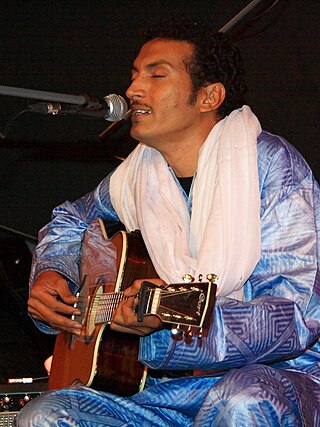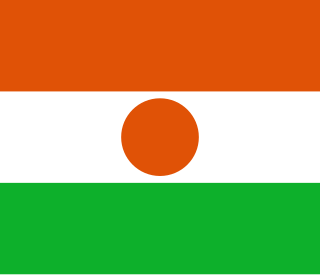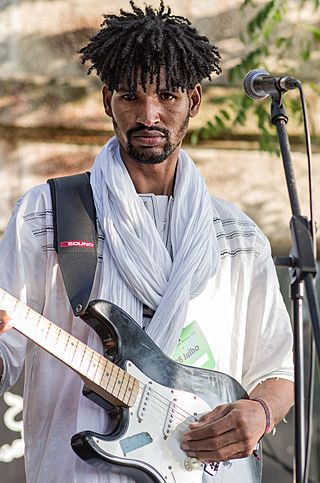
The music of Niger has developed from the musical traditions of a mix of ethnic groups; Hausa, the Zarma-Songhai, Tuareg, Fula, Kanuri, Toubou, Diffa Arabs and Gurma and the Boudouma from Lac Chad.
Electroacoustic music is a genre of popular and Western art music in which composers use technology to manipulate the timbres of acoustic sounds, sometimes by using audio signal processing, such as reverb or harmonizing, on acoustical instruments. It originated around the middle of the 20th century, following the incorporation of electric sound production into compositional practice. The initial developments in electroacoustic music composition to fixed media during the 20th century are associated with the activities of the Groupe de recherches musicales at the ORTF in Paris, the home of musique concrète, the Studio for Electronic Music in Cologne, where the focus was on the composition of elektronische Musik, and the Columbia-Princeton Electronic Music Center in New York City, where tape music, electronic music, and computer music were all explored. Practical electronic music instruments began to appear in the early 20th century.

Agadez, formerly spelled Agadès, is the fifth largest city in Niger, with a population of 110,497 based on the 2012 census. The capital of the eponymous Agadez Region, the city lies in the Sahara desert, and is also the capital of Aïr, one of the traditional Tuareg–Berber federations. The historic centre of the town has been designated a World Heritage Site by UNESCO.

Mamar Kassey is a jazz-pop-ethnic band from Niger. It is named after Askia Muhammad I, a legendary warrior who extended the Songhai Empire into the Sahara.
Amadou Boubacar Cissé is a Nigerien politician. He served as the Prime Minister of Niger on two occasions, from 8 to 21 February 1995 and again from 21 December 1996 to 27 November 1997. He has led a political party, the Union for Democracy and the Republic (UDR-Tabbat) since 1999. He was appointed as Minister of State for Planning in 2011.
Souley Abdoulaye was a Nigerien politician. He served as the prime minister of Niger from 28 September 1994 to 8 February 1995. He later served in the government under President Ibrahim Baré Maïnassara as Minister of Transport from 1996 to 1997 and then as Minister of the Interior, in charge of police and internal security, from 1997 to 1999.
Constant Martin was a French engineer and inventor who perfected and successfully commercialised radio sets and most famously the Clavioline, a precursor to the synthesizer. He is the grandfather of director Michel Gondry and Oliver "Twist" Gondry.
The Cinema of Niger began in the 1940s with the ethnographical documentary of French director Jean Rouch, before growing to become one of the most active national film cultures in Francophone Africa in the 1960s-70s with the work of filmmakers such as Oumarou Ganda, Moustapha Alassane and Gatta Abdourahamne. The industry has slowed somewhat since the 1980s, though films continue to be made in the country, with notable directors of recent decades including Mahamane Bakabe, Inoussa Ousseini, Mariama Hima, Moustapha Diop and Rahmatou Keïta. Unlike neighbouring Nigeria, with its thriving Hausa and English-language film industries, most Nigerien films are made in French with Francophone countries as their major market, whilst action and light entertainment films from Nigeria or dubbed western films fill most Nigerien theatres.
Mass media in Niger is a diverse collection of public and private entities, both print and broadcast, centered in the capital of Niamey, but with vibrant regional centers. The media has historically been state funded, and focused on radio broadcast media, as the nation's population is spread over great distances. Niamey boasts scores of newspapers and magazines, many of which are fiercely critical of the government. These papers though have very small circulations, and almost none outside the cities.

Omara "Bombino" Moctar is a Tuareg singer-songwriter and guitarist from Niger. His music is sung in Tamasheq and often addresses Tuareg geopolitical concerns. Bombino is the subject of the documentary film Agadez, the Music and the Rebellion.
Abdoulaye Hamani Diori was a Nigerien political leader and businessman. The son of Niger's first President, he waged a political and abortive military struggle against the Military regime that overthrew his father. With the return of democracy to Niger, Abdoulaye became head of his father's political party, and maintained a small but influential place in the political life of Niger until his death in 2011. Abdoulaye was married with four children. A Muslim, he earned the honorific 'Hadji' after making the pilgrimage to Mecca. He died 25 April 2011 at National Hospital in Niamey, aged 65, following an illness.

Niger competedwith six athletes in five sports at the 2012 Summer Olympics in London, held from 27 July to 12 August 2012. This was the nation's eleventh appearance at the Olympics, having competed at every Summer Olympics since 1964 with the exception of the 1976 Summer Olympics in Montreal, and the 1980 Summer Olympics in Moscow because of the African and the United States boycotts.

Mahamadou Souleymane, known professionally as Mdou Moctar, is a Tuareg songwriter and musician based in Agadez, Niger, who performs modern rock music inspired by Tuareg guitar music. His music first gained attention through a trading network of mobile phones and memory cards in West Africa. He sings in the Tamasheq language. Moctar's fourth album, Ilana: The Creator, released in 2019, was the first to feature a full band. He plays guitar in the takamba and assouf styles. He also appeared in the 2015 film Akounak Tedalat Taha Tazoughai.

Les Filles de Illighadad are a Tuareg band founded by Fatou Seidi Ghali in Illighadad, a village in the Sahara Desert in Niger. Ghali, it is claimed, is the first Tuareg woman to play guitar professionally.

Sahel Sounds is an American record label, based in Portland, Oregon which specializes in music from the southern part of the Sahara desert.

Abdallah Oumbadougou was a guitarist from Niger. He was one of the founders of the ishumar genre of the desert blues, a politicized, guitar-driven musical genre of the Kel Tamasheq people of North Africa's Sahel.

The 2021 Nigerien coup d'etat attempt occurred on 31 March at around 3 am WAT after gunfire erupted in the streets of Niamey, the capital of Niger, two days before the inauguration of president-elect Mohamed Bazoum.
Zerzura is a 2017 Nigerien western film directed by Christopher Kirkley and co-produced by director himself with Rhissa Koutata, Ahmoudou Madassane, and Guichene Mohamed. The film stars Habiba Almoustapha with Ahmoudou Madassane, Ibrahim Affi, and Zara Alhassane in supporting roles. It is an ethnofiction shot in the Sahara desert, where a young man from Niger leaves home in search of an enchanted oasis.

The M62 Movement, officially known as "M62: Sacred Union for the Safeguard of the Sovereignty and Dignity of the People", is a political movement in Niger. It was established in 2022 by a coalition of civil society organizations, as a reaction against the French military's presence during the ongoing Operation Barkhane.
Bilabrin is a village located in the commune of N'guigmi, Diffa Region, in southeast Niger. The village is approximately six kilometers west of the Chad–Niger border.










